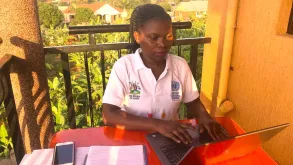Annet Nakaliti is a national UN Volunteer serving with United Nations Population Fund (UNFPA) Uganda. She is supporting her agency as the Innovator in Mobile Health in order to produce creative ideas to ensure access to sexual reproductive health. She shared why she believes accelerating mobile health innovation can help tackle COVID-19 in Africa.
On 11 March, the World Health Organization characterized COVID-19 as a pandemic. Africa was initially spared from the outbreak; however, this has since changed rapidly. The entry of COVID-19 onto the continent is a serious issue of concern to the region's socio-economic and political stability. According to WHO, Africa bears 71% of the global distribution of communicable diseases, against a backdrop of relatively weaker health-care systems.
I joined the as a national UN Volunteer in 2019. I support UNFPA’s work through improving health data and building Uganda’s capacity to track progress towards the health-related Sustainable Development Goals and Universal Health Coverage. My journey as an innovator in mobile health for the last 12 months has allowed me to appreciate the tremendous potential of mobile health technology in helping the continent accelerate progress in health-care service provision. The sudden challenge posed by COVID -19 on the continent makes the need to harness this potential even greater and very urgent.
Mobile Health (mHealth) is the utilization of mobile technology such as short messaging service (SMS), wireless data transmission, voice calling, and smartphone applications to transmit health-related information or direct care. Despite Africa’s healthcare challenges, the economic and technological advancements in the region provide opportunities to develop sustainable mobile health solutions to improve health care, particularly in response to the COVID-19 pandemic. Undeniably, we can significantly use technology for faster and more effective response to COVID 19. Mobile digital technologies are increasingly popular and very necessary in most African countries, because they allow the transition from low infrastructure to the fourth industrial revolution without expensive investment in traditional infrastructures.
Undeniably, we can significantly use technology for faster and more effective response to COVID 19.
While varied pathways for application of mobile technology-based as part of COVID-19 response exist, I believe that such technology can be best deployed to immediately support contact tracing for COVID-19 infections; surveillance; quarantine control and management; testing and dissemination of relevant information. Deployment of mobile phone applications and big data, for example, creates more detailed and real-time targeting opportunities that can be useful for contact tracing, quarantine management and health information dissemination that help counter prevalent misinformation. A real-world example is the online data aggregation platform created by Uber, the mobile-based taxi platform, for public health authorities to contact the company for COVID 19 related information about riders and drivers. For people who lack data access, use of call records and SMS systems can be easily deployed with currently available technological capabilities.
However, several policy regulatory issues need to be addressed if such technologies are to be deployed effectively and humanely while adhering to international human rights guidelines.
However, several policy regulatory issues need to be addressed if such technologies are to be deployed effectively and humanely while adhering to international human rights guidelines. Throughout my assignment as a national UN Volunteer at UNFPA in Uganda, I have worked with key stakeholders to scale mobile health innovation and strengthen UNFPA's relationship with strategic partners and Uganda’s Ministry of Health to establish such enabling policies. Examples of policies I have helped develop include standards for the interoperability of health information exchange and electronic medical records. I also provide support to the Health Data Collaborative platform to strengthen health data access and decision making. These standards enable the sharing of health-related information from different health information systems, including those that relate to UNFPA’s mandate such as prevention of gender-based violence and promotion of positive reproductive health behaviors among youth.
I also provide support to the Health Data Collaborative platform to strengthen health data access and decision making.
Additionally, I have offered support to the country office through mapping the innovations ecosystem, including innovation hubs to understand the challenges and support needed to improve and scale up health innovations that can help leverage mobile technology for improved access to health care. I am very excited to be helping bridge the gap between policymakers, implementing partners and innovators of health solutions in Uganda. I am particularly eager to see how these innovations can help respond to COVID-19.

